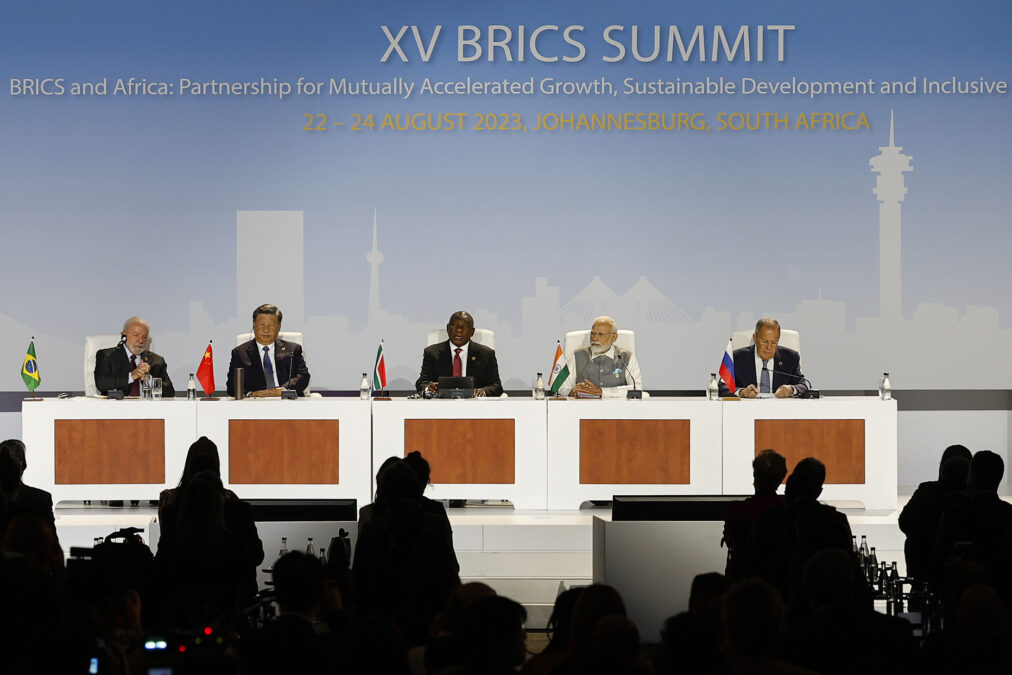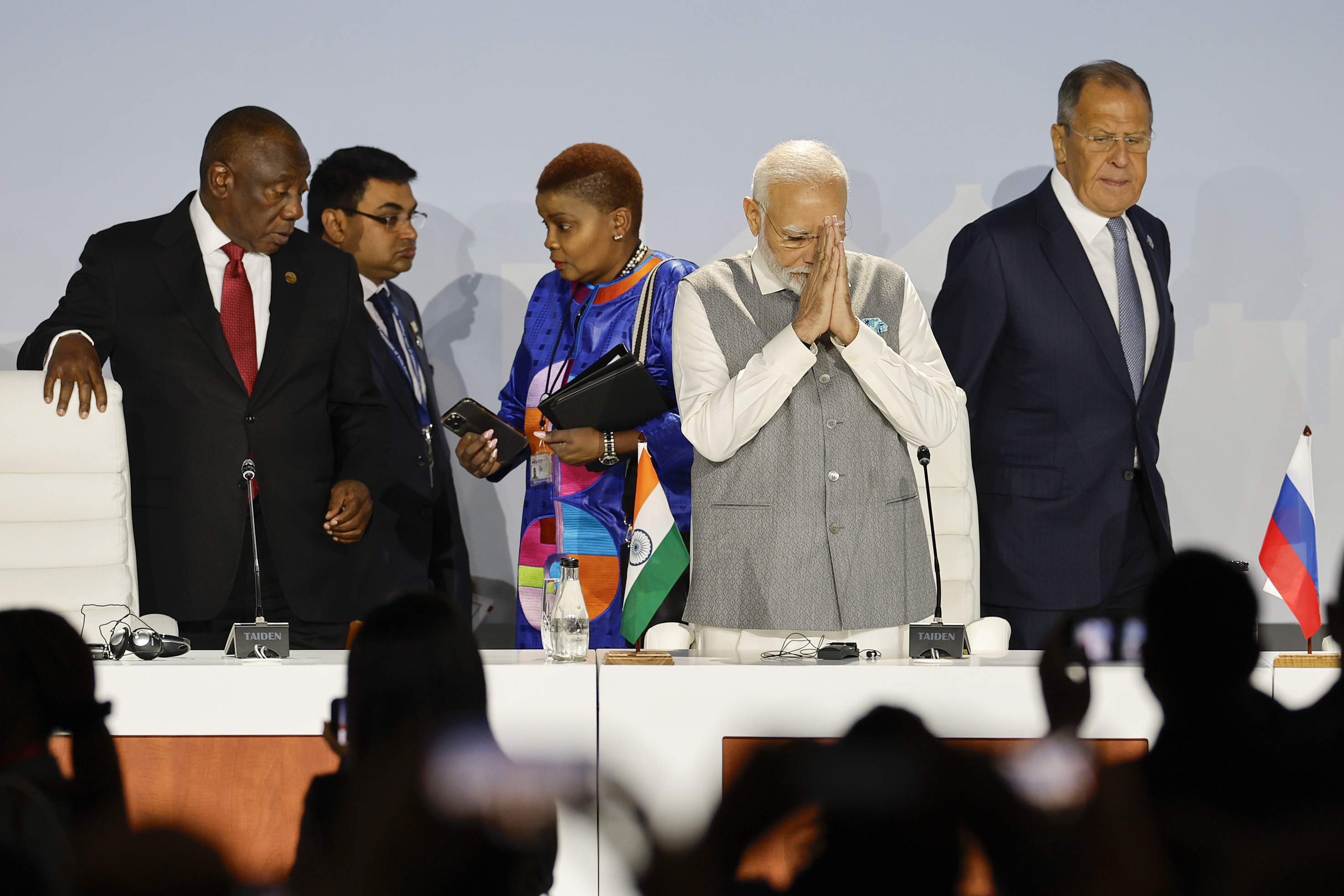JOHANNESBURG — BRICS leaders announced on Thursday the admission of six new countries — including Saudi Arabia and the United Arab Emirates — from next year as the club of large and populous emerging economies seeks to reshape the global order.
The BRICS — Brazil, Russia, India, China and South Africa — agreed at their annual summit to make Argentina, Ethiopia, Iran, Saudi Arabia, Egypt and the United Arab Emirates full members from January 1.
“This membership expansion is historic,” said Chinese President Xi Jinping, whose nation is the most powerful in the group of non-Western states that represents a quarter of the world’s economy.
“The expansion is also a new starting point for BRICS cooperation. It will bring new vigour to the BRICS cooperation mechanism and further strengthen the force for world peace and development.”
Also Read UAE, KSA optimistic as BRICS leaders weigh expansion
Ethiopian Prime Minister Abiy Ahmed hailed what he called “a great moment” for his country.
“Ethiopia stands ready to cooperate with all for an inclusive and prosperous global order,” he said on X, formerly known as Twitter.
We respect the vision of the BRICS leadership and appreciate the inclusion of the UAE as a member to this important group. We look forward to a continued commitment of cooperation for the prosperity, dignity and benefit of all nations and people around the world.
UAE President Sheikh Mohamed bin Zayed Al Nahyan
In Iran, senior presidential advisor Mohammad Jamshidi described the move as a “historic development and a strategic success” for Tehran’s foreign policy.
Calls to enlarge the BRICS had dominated the agenda at its three-day summit in Johannesburg and exposed divisions among the bloc over the pace and criteria for admitting new members.
But the group, which makes decisions by consensus, had agreed on “the guiding principles, standards, criteria and procedures of the BRICS expansion process”, said South African President Cyril Ramaphosa.
Nearly two dozen countries had formally applied to join the club from across the “Global South”, a broad term referring to non-Western nations. Some 50 other heads of state and government attended the summit, underscoring what BRICS leaders say is the attractiveness of its message.
Rising clout
US officials have played down the likelihood of BRICS emerging as a geopolitical rival, describing the bloc as a highly diverse collection of countries containing both friends and rivals.
We look forward to develop this cooperation to create new developmental and economic opportunities and elevate our relationship to the aspired level.
Saudi Arabia’s Foreign Minister Prince Faisal bin Farhan
The BRICS are a disparate mix of big and small economies, democratic and authoritarian states, and the candidates seeking membership and those admitted to the club also reflect this variety.
But despite differences, BRICS leaders expressed a common belief that the international system was dominated by Western states and institutions and was not serving the interests of developing nations.
Brazilian President Luiz Inacio Lula da Silva said with the admission of six new members, the bloc now represented 46 percent of the world’s population and an even greater share of its economic output.
The summit underlined divisions with the West over the war in Ukraine, and the support Russia enjoys from its BRICS partners at a time of global isolation. South Africa, China and India have not condemned Russia’s invasion while Brazil has refused to join Western nations in sending arms to Ukraine or imposing sanctions on Moscow. (With AFP inputs)
Iran hails BRICS membership
A senior adviser to Iran’s president on Thursday hailed the country’s forthcoming admission to the BRICS grouping as a triumph of diplomacy for the Islamic republic.

The BRICS club — which comprises Brazil, Russia, India, China and South Africa — will be welcoming Iran along with other five countries as permanent members starting next year.
Thursday’s announcement came amid intensified diplomacy by Iran to reduce its isolation, improve its economy and offset the impact of crippling sanctions reimposed after the 2018 withdrawal of the United States from a landmark nuclear deal.
“Permanent membership in the group of global emerging economies is considered a historic development and a strategic success for the foreign policy of the Islamic republic,” Mohammad Jamshidi wrote on X, formerly known as Twitter.
The BRICS grouping represents 23 percent of the world’s gross domestic product and 42 percent of the world’s population. It is seeking to dull Western economic domination in global affairs.
Egypt, the United Arab Emirates, Saudi Arabia, Argentina and Ethiopia will also be joining BRICS from 2024, according to the announcement by South African President Cyril Ramaphosa.
Last month, Iran became the ninth member of the Shanghai Cooperation Organisation which encompasses a vast stretch of the globe from Moscow to Beijing and includes around half the world’s population.








